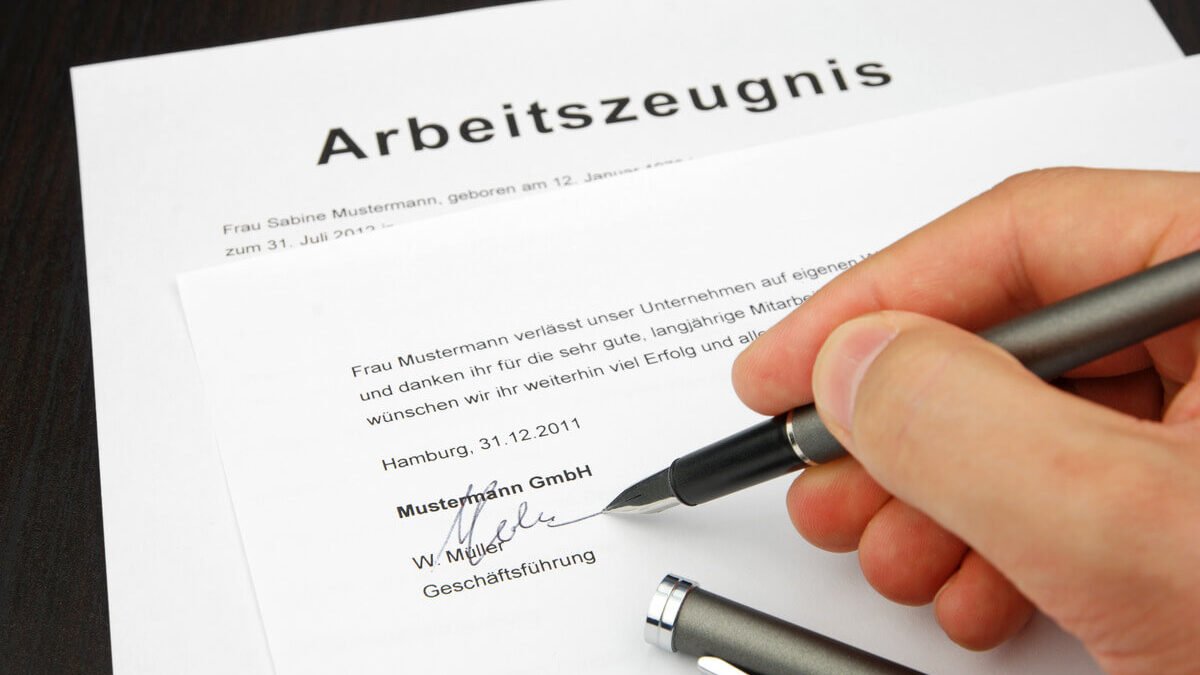
As an expatriate working in Germany, obtaining a job reference letter is a significant milestone in your career. This document can greatly influence future employment opportunities, making it crucial to understand its importance, the legal framework surrounding it, and the key elements it should contain. This article will provide a comprehensive guide on job reference letters, tailored specifically for international employees in Germany.
Calculate your severance payment
Calculate the settlement amount for your individual case in 2 minutes
What is a Job Reference Letter?
A job reference letter, known as an “Arbeitszeugnis” in German, is a letter provided by an employer that outlines an employee’s performance, behavior, and work history. It is a crucial document for job applications and is highly valued by German employers.
Types of Job Reference Letters:
- Simple Reference Letter (Einfaches Arbeitszeugnis): Contains basic information such as job title, duration of employment, and a brief job description.
- Detailed Reference Letter (Qualifiziertes Arbeitszeugnis): Includes comprehensive information on the employee’s responsibilities, performance, skills, and behavior during their tenure.
Legal Framework for Job Reference Letters
Under German labor law, employees have the right to receive a job reference letter upon termination of employment. This right is enshrined in Section 109 of the Gewerbeordnung (Industrial Code). The reference letter must be:
- Truthful and Accurate: Reflect the employee’s actual performance and behavior.
- Benevolent and Favorable: Written in a way that safeguards the employee’s future employment prospects.
Key Elements of an Employment reference letter
A well-crafted job reference letter typically includes the following elements:
- Introduction:
- Employee’s name
- Start and end dates of employment
- Job title and department
- Job Description:
- Detailed description of the tasks and responsibilities
- Specific projects or notable achievements
- Performance Evaluation:
- Assessment of work quality and efficiency
- Mention of key skills and competencies
- Behavior and Conduct:
- Description of cooperation with colleagues and supervisors
- Communication skills and adaptability
- Conclusion:
- Reason for leaving (optional but recommended)
- Final remarks and best wishes for the future
- Signature and company stamp
Free initial consultation with a lawyer
Quick callback after 1 to 2 hours for a free initial consultation with a lawyer
Why is a Reference Letter Important?
For expatriates, a job reference letter holds significant weight in the German job market for several reasons:
Validation of Experience:
- Provides potential employers with a verified record of your professional history and achievements.
Legal and Cultural Expectations:
- Reflects compliance with local labor laws and cultural norms, demonstrating that you understand German workplace expectations.
Enhanced Job Prospects:
- A well-written, positive reference can give you a competitive edge in the job market.
How to Request a Job Reference Letter
When requesting a job reference letter, it is important to approach the matter professionally and tactfully:
- Timing:
- Request the letter well in advance of your departure or during your notice period.
- Avoid last-minute requests which might lead to rushed and incomplete references.
- Written Request:
- Make a formal written request to your immediate supervisor or HR department.
- Clearly state the type of reference letter you require (simple or detailed).
- Provide Details:
- Highlight specific achievements or projects you would like mentioned.
- Offer a brief summary of your responsibilities to assist your employer in crafting a detailed reference.

Free initial consultation with a specialist lawyer
- Free initial consultation with a lawyer
- Quick callback after 1 to 2 hours
- Strategy for negotiating the severance pay
Common Phrases in Reference Letters
German job reference letters often use standard phrases that carry nuanced meanings. Understanding these can help you interpret the content and spot red flags:
- “Stets zur vollen Zufriedenheit”: Indicates very good performance.
- “Stets zu unserer Zufriedenheit”: Reflects good performance.
- “Zu unserer Zufriedenheit”: Suggests average performance.
- “Bemühte sich”: Implies the employee tried but did not excel.
Reviewing Your Employment reference letters
Once you receive your job reference letter, review it thoroughly to ensure it accurately reflects your performance:
- Check for Accuracy:
- Verify that all personal and employment details are correct.
- Ensure that your job title and responsibilities are accurately described.
- Evaluate the Language:
- Look for positive and flattering phrases.
- Be wary of any ambiguous or subtly negative wording.
- Seek Legal Advice:
- If you spot any inaccuracies or potentially damaging language, consult with a labor lawyer.
- You have the right to request revisions for a fair and accurate representation.
Importance of a Detailed Reference Letter
While a simple reference letter confirms employment, a detailed reference letter offers a comprehensive assessment of your professional attributes. This can be especially beneficial for expatriates as it:
- Substantiates Your Experience:
- Provides a rich narrative of your professional journey, making it easier for future employers to gauge your fit for a role.
- Highlights Your Strengths:
- Emphasizes your contributions and achievements, showcasing your value to potential employers.
- Builds Trust:
- Detailed feedback from former employers can help build trust with new employers, assuring them of your proven track record.
Free initial consultation with a lawyer
Quick callback after 1 to 2 hours for a free initial consultation with a lawyer
Practical Tips for Expatriates
Navigating job reference letters in a foreign country can be daunting. Here are some practical tips for expatriates in Germany:
- Understand the Cultural Context:
- Recognize the importance of job reference letters in the German job market.
- Familiarize yourself with common phrases and their implications.
- Communicate Clearly:
- When requesting the letter, clearly communicate your expectations and any specific points you wish to be included.
- Provide your employer with ample time to compose a thoughtful and detailed reference.
- Utilize Professional Services:
- If language is a barrier, use translation services to ensure you fully understand the content of your reference letter.
- Consider seeking assistance from career coaches or expatriate support organizations.
Job Reference Letters in the Context of Job Applications
When applying for new roles, understanding how to present and use your job reference letter effectively can significantly impact your success:
Include in Your Application Package:
- Attach the reference letter to your CV and cover letter, providing potential employers with a complete overview of your qualifications.
- Highlight specific achievements mentioned in the reference letter in your CV to reinforce your skills and experience.
During Interviews:
- Be prepared to discuss the content of your reference letter during job interviews.
- Use the reference letter to substantiate your claims about your performance and achievements.
Conclusion
A job reference letter is a pivotal document for expatriates in Germany seeking to advance their careers. Understanding the legal framework, key elements, and cultural significance of job reference letters can help you navigate this process with confidence. Always approach the request professionally, review the content meticulously, and seek professional advice when necessary. A well-crafted, positive job reference letter can open doors to new opportunities and enhance your career prospects in Germany.

Free initial consultation with a specialist lawyer
- Free initial consultation with a lawyer
- Quick callback after 1 to 2 hours
- Strategy for negotiating the severance pay





